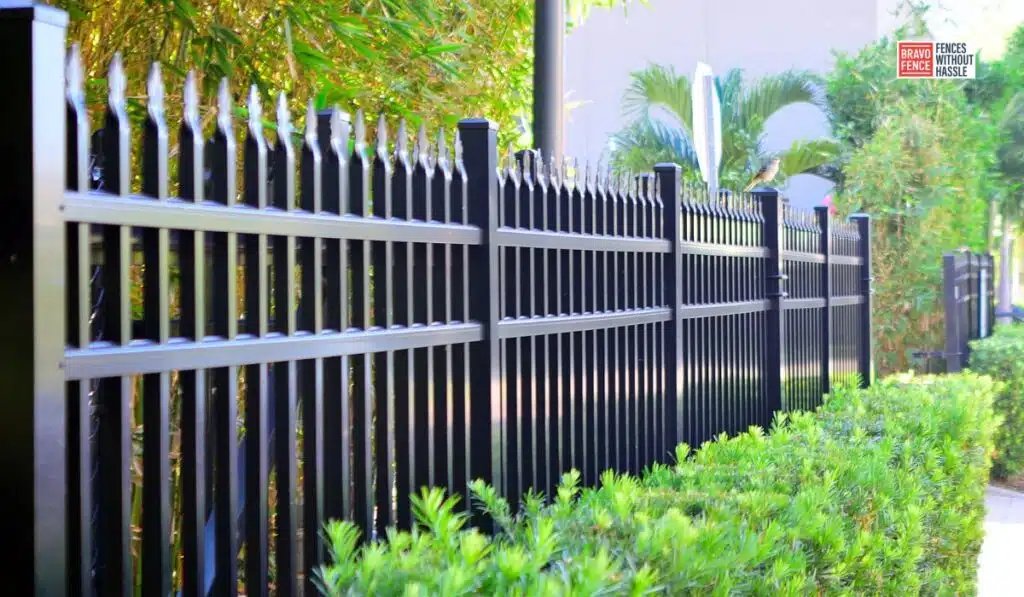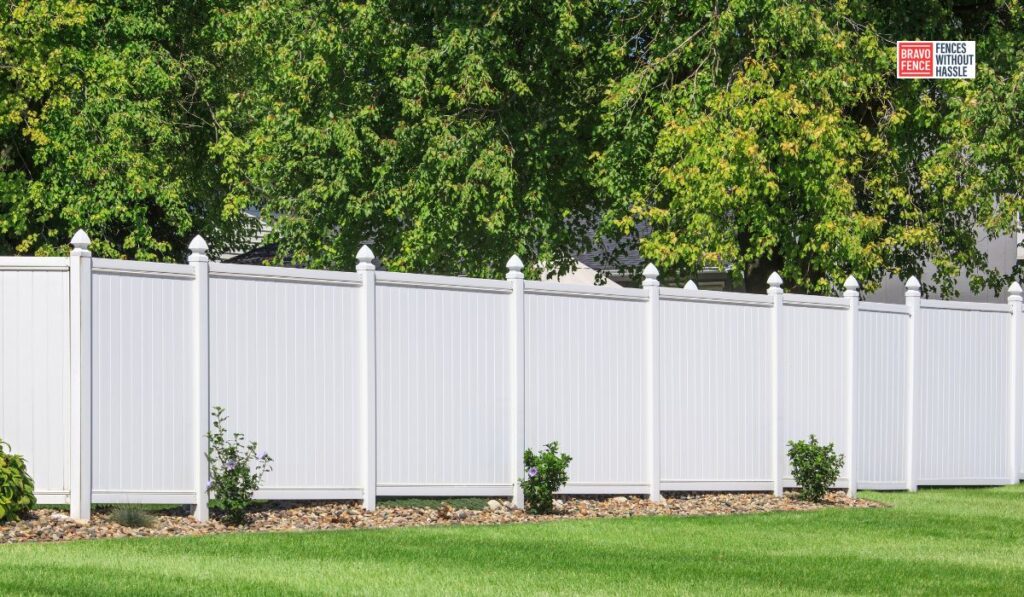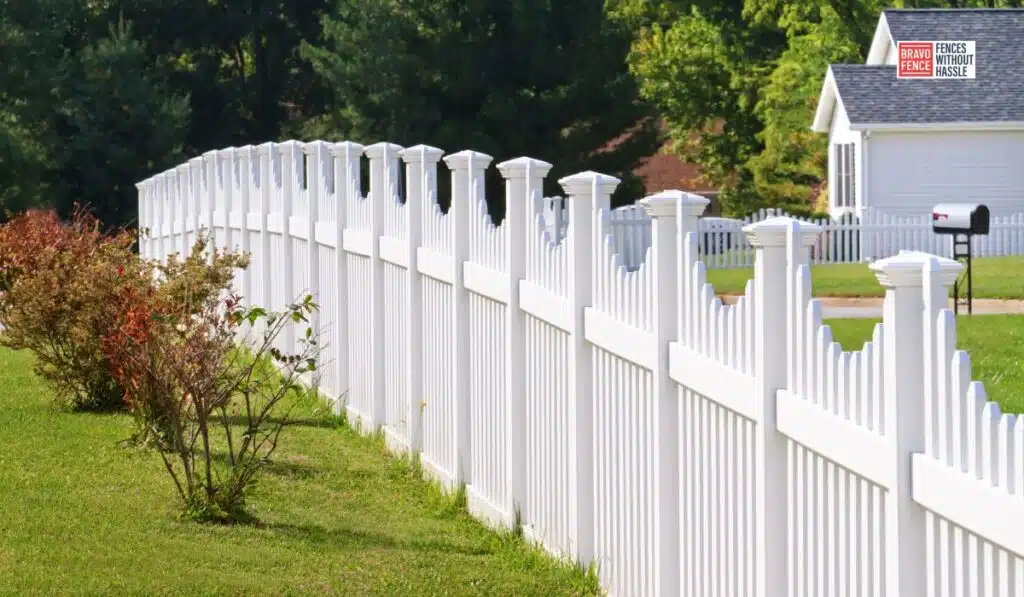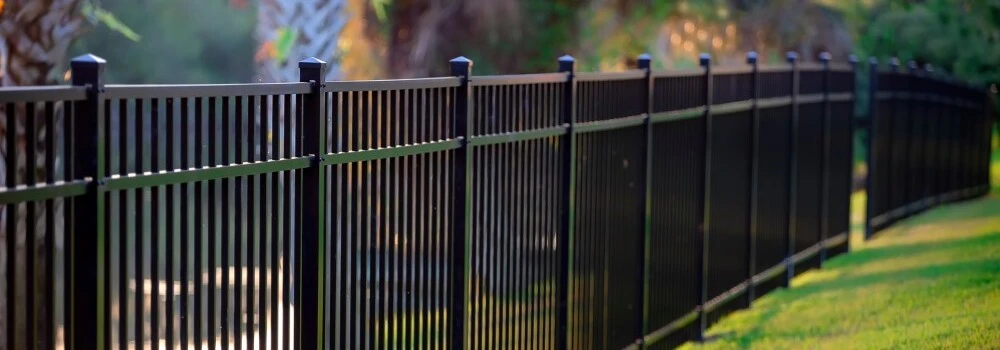
Aluminum Fencing vs. Vinyl Fencing: Pros and Cons of Each Material
Two materials stand out among fencing options for residential and commercial properties: aluminum and vinyl.
Each material offers its own set of advantages and disadvantages, catering to different preferences, budgets, and needs of property owners.
In this comprehensive guide, we’ll delve into the pros and cons of aluminum fencing and vinyl fencing, allowing you to make an informed decision when selecting the perfect fencing material for your project.
Introduction to Aluminum Fencing and Vinyl Fencing
What is Aluminum Fencing?
Aluminum fencing is a type of fencing constructed from aluminum alloy, offering a lightweight yet durable solution for enclosing outdoor spaces.
Known for its versatility and aesthetic appeal, aluminum fencing has become a popular choice for both residential and commercial properties.
What is Vinyl Fencing?
Vinyl fencing, also referred to as PVC fencing, is made from polyvinyl chloride (PVC), a type of plastic.
It is valued for its low maintenance requirements, durability, and variety of styles and colors available in the market.
Pros and Cons of Aluminum Fencing
Pros of Aluminum Fencing

- Durability: Aluminum fencing is highly durable and capable of withstanding harsh weather conditions, including rain, snow, and UV exposure.
- Low Maintenance: Unlike wood fencing, aluminum fencing requires minimal maintenance.
It does not rust, corrode, or warp over time, eliminating the need for regular painting or staining.
- Versatility: Aluminum fencing is available in a wide range of styles, colors, and designs, allowing property owners to choose the option that best complements their architectural style and preferences.
- Security: Aluminum fencing provides excellent security for residential and commercial properties, serving as a deterrent to intruders while still maintaining visibility and aesthetics.
- Environmentally Friendly: Aluminum is a recyclable material, making it an environmentally friendly choice for fencing projects.
Cons of Aluminum Fencing
- Cost: Aluminum fencing tends to be more expensive upfront compared to some other fencing materials, such as wood or chain-link.
- Installation Complexity: While aluminum fencing is lightweight, its installation can be more complex, especially for sloped or uneven terrain, requiring professional installation in many cases.
- Limited Privacy: Aluminum fencing does not offer the same level of privacy as solid wood or vinyl fencing, as it typically consists of spaced pickets or rails.
Pros and Cons of Vinyl Fencing
Pros of Vinyl Fencing
- Low Maintenance: Vinyl fencing requires minimal maintenance, as it does not rot, warp, or splinter like wood.
It can be easily cleaned with soap and water, maintaining its appearance for years to come.
- Durability: Vinyl fencing is highly durable and resistant to damage from pests, moisture, and sunlight.
It does not rust or corrode, making it suitable for various climates.
- Variety of Styles: Vinyl fencing is available in a wide range of styles, including privacy, semi-privacy, picket, and ranch rail, allowing property owners to choose the option that best suits their needs.
- Longevity: Vinyl fencing has a long lifespan, often lasting upwards of 20-30 years, with proper care and maintenance.
- Ease of Installation: Vinyl fencing is relatively easy to install, especially compared to materials like wrought iron or aluminum.
Many vinyl fence systems feature interlocking panels, reducing the need for specialized tools or expertise.
Cons of Vinyl Fencing
- Initial Cost: While vinyl fencing offers long-term cost savings through its low maintenance requirements, it tends to have a higher initial cost compared to materials like wood or chain-link fencing.
- Limited Repair Options: In the event of damage, such as cracks or breaks, repairing vinyl fencing can be challenging, often requiring the replacement of entire sections rather than individual components.
- Environmental Impact: While vinyl fencing is durable and long-lasting, it is not biodegradable and can have a significant environmental impact at the end of its lifespan if not properly recycled.
Conclusion
In conclusion, both aluminum fencing and vinyl fencing offer unique advantages and disadvantages, making them suitable for different applications and preferences.
Aluminum fencing excels in durability, versatility, and customization options, while vinyl fencing offers low maintenance, fade resistance, and a wide range of styles to choose from.
By carefully considering the specific needs, budget, and environmental factors of your project, you can select the fencing material that best aligns with your goals and enhances the beauty and functionality of your outdoor space.
Ready to enhance your property with high-quality fencing?
Contact Bravo Fence Company today to explore your options and schedule a consultation with our experienced team of fencing experts.
FAQs
What factors should I consider when choosing between aluminum and vinyl fencing?
Consider factors such as durability, maintenance requirements, cost, design options, and environmental impact.

Is aluminum fencing more expensive than vinyl fencing?
Aluminum fencing is generally more expensive upfront than vinyl fencing. However, long-term maintenance costs should also be considered.
How do I decide between aluminum and vinyl fencing for my property?
Consider your specific needs and preferences, such as desired aesthetic, level of maintenance desired, security requirements, and budget.
Can aluminum fencing be painted or customized?
Aluminum fencing can be customized with different styles and colors. While it is not typically painted like wood fencing, it comes in a variety of powder-coated finishes.
Is vinyl fencing suitable for all climates?
Vinyl fencing is suitable for various climates as it is resistant to moisture, pests, and sunlight. However, extreme temperature fluctuations may affect its durability over time.
How does aluminum fencing compare to vinyl fencing in terms of privacy?
Vinyl fencing typically offers more privacy options, such as solid panels, compared to aluminum fencing, which often consists of spaced pickets or rails.
Can I install gates and accessories with both aluminum and vinyl fencing?
Yes, both aluminum and vinyl fencing can accommodate gates and various accessories to suit your property’s needs.
Are there any regulations or restrictions regarding the installation of aluminum or vinyl fencing?
Regulations may vary depending on your location and homeowners association guidelines. Before installing either type of fencing, it’s essential to check local building codes and regulations.
How do I maintain aluminum and vinyl fencing?
Aluminum fencing requires minimal maintenance, while vinyl fencing can be easily cleaned with soap and water. Both materials do not require painting or staining.
Can I install either aluminum or vinyl fencing myself, or do I need professional installation?
While DIY installation is possible for both materials, professional installation is recommended, especially for complex installations or if you need to become more experienced with fencing installation.
What are the warranties typically offered for aluminum and vinyl fencing?
Warranties vary by manufacturer but typically range from 10 to 30 years for aluminum and vinyl fencing. They cover defects in materials and artistry.
Can I install lighting or security features with aluminum or vinyl fencing?
Yes, both aluminum and vinyl fencing can accommodate lighting fixtures and security features to enhance functionality and aesthetics.
How do aluminum and vinyl fencing compare in terms of maintenance requirements?
Aluminum fencing requires minimal maintenance, typically limited to occasional cleaning with mild soap and water. Vinyl fencing also has low maintenance needs and can be cleaned similarly.
Which fencing material is better for withstanding harsh weather conditions?
Both aluminum and vinyl fencing are designed to withstand various weather conditions. However, aluminum fencing is particularly resistant to rust and corrosion, making it suitable for coastal areas with salt exposure.
Are there any specific installation considerations for either aluminum or vinyl fencing?
While aluminum fencing is lightweight, installation on uneven terrain or slopes may require additional expertise. Vinyl fencing, while relatively easy to install, may require careful alignment to ensure durability.
Can I customize the height or style of aluminum and vinyl fencing to suit my property?
Yes, both aluminum and vinyl fencing can be customized in terms of height, style, and design to match your property’s specific requirements and aesthetic preferences.
Tags: Complete Guide to Fence Material Comparison, Complete Guide to Vinyl Fence Designs, Everything You Need to Know About Aluminum Fencing Cost, Everything You Need to Know About Fence Installation Tips, Everything You Need to Know About Maintenance Of Aluminum Fences, Explore Helpful Resources on Aluminum Fence Benefits, Explore Helpful Resources on Vinyl Fence Upkeep, Explore Helpful Resources on Vinyl Fencing Price, Top Ideas and Insights About Aluminum Fence Styles, Top Ideas and Insights About Aluminum Vs Vinyl Durability, Top Ideas and Insights About Vinyl Fence Advantages

